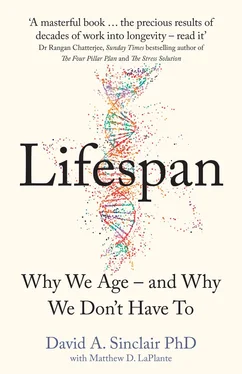It is there in us.
I propose the reason this gene circuit is conserved is that it is a rather simple and elegant solution to the challenges of a sometimes brutish and sometimes bounteous world that better ensures the survival of the organisms that carry it. It is, in essence, a primordial survival kit that diverts energy to the area of greatest need, fixing what exists in times when the stresses of the world are conspiring to wreak havoc on the genome, while permitting reproduction only when more favorable times prevail.
And it is so simple and so robust that not only did it ensure life’s continued existence on the planet, it ensured that Earth’s chemical survival circuit was passed on from parent to offspring, mutating and steadily improving, helping life continue for billions of years, no matter what the cosmos brought, and in many cases allowing individuals’ lives to continue for far longer than they actually needed to.
The human body, though far from perfect and still evolving, carries an advanced version of the survival circuit that allows it to last for decades past the age of reproduction. While it is interesting to speculate why our long lifespans first evolved—the need for grandparents to educate the tribe is one appealing theory—given the chaos that exists at the molecular scale, it’s a wonder we survive thirty seconds, let alone make it to our reproductive years, let alone reach 80 more often than not.
But we do. Marvelously we do. Miraculously we do. For we are the progeny of a very long lineage of great survivors. Ergo, we are great survivors.
But there is a trade-off. For this circuit within us, the descendant of a series of mutations in our most distant ancestors, is also the reason we age.
And yes, that definite singular article is correct: it is the reason.
TO EVERYTHING THERE IS A REASON
If you are taken aback by the notion that there is a singular cause of aging, you are not alone. If you haven’t given any thought at all as to why we age, that’s perfectly normal, too. A lot of biologists haven’t given it much thought, either. Even gerontologists, doctors who specialize in aging, often don’t ask why we age—they simply seek to treat the consequences.
This isn’t a myopia specific to aging. As recently as the late 1960s, for example, the fight against cancer was a fight against its symptoms. There was no unified explanation for why cancer happens, so doctors removed tumors as best they could and spent a lot of time telling patients to get their affairs in order. Cancer was “just the way it goes,” because that’s what we say when we can’t explain something.
Then, in the 1970s, genes that cause cancer when mutated were discovered by the molecular biologists Peter Vogt and Peter Duesberg. These so-called oncogenes shifted the entire paradigm of cancer research. Pharmaceutical developers now had targets to go after: the tumor-inducing proteins encoded by genes, such as BRAF , HER2 , and BCR-ABL . By inventing chemicals that specifically block the tumor-promoting proteins, we could finally begin to move away from using radiation and toxic chemotherapeutic agents to attack cancers at their genetic source, while leaving normal cells untouched. We certainly haven’t cured all types of cancer in the decades since then, but we no longer believe it’s impossible to do so.
Indeed, among an increasing number of cancer researchers, optimism abounds. And that hopefulness was at the heart of what was arguably the most memorable part of President Barack Obama’s final State of the Union address in 2016.
“For the loved ones we’ve all lost, for the family we can still save, let’s make America the country that cures cancer once and for all,” Obama said as he stood in the House of Representatives chamber and called for a “cancer moon shot.” When he placed then Vice President Joe Biden—whose son Beau had died of brain cancer a year earlier—in charge of the effort, even some of the Democrats’ staunch political enemies had trouble holding back the tears.
In the days and weeks that followed, many cancer experts noted that it would take far more than the year remaining to the Obama-Biden administration to end cancer. Very few of those experts, however, said it absolutely couldn’t be done. And that’s because, in the span of just a few decades, we had completely changed the way we think about cancer. We no longer submit ourselves to its inevitability as part of the human condition.
One of the most promising breakthroughs in the past decade has been immune checkpoint therapy, or simply “immunotherapy.” Immune T-cells continually patrol our body, looking for rogue cells to identify and kill before they can multiply into a tumor. If it weren’t for T-cells, we’d all develop cancer in our twenties. But rogue cancer cells evolve ways to fool cancer-detecting T-cells so they can go on happily multiplying. The latest and most effective immunotherapies bind to proteins on the cancer cells’ surface. It is the equivalent of taking the invisible cloak off cancer cells so T-cells can recognize and kill them. Although fewer than 10 percent of all cancer patients currently benefit from immunotherapy, that number should increase thanks to the hundreds of trials currently in progress.
We continue to rail against a disease we once accepted as fate, pouring billions of dollars into research each year, and the effort is paying off. Survival rates for once lethal cancers are increasing dramatically. Thanks to a combination of a BRAF inhibitor and immunotherapy, survival of melanoma brain metastases, one of the deadliest types of cancer, has increased by 91 percent since 2011. Between 1991 and 2016, overall deaths from cancer in the United States declined by 27 percent and continue to fall. 19That’s a victory measured in millions of lives.
Aging research today is at a similar stage as cancer research was in the 1960s. We have a robust understanding of what aging looks like and what it does to us and an emerging agreement about what causes it and what keeps it at bay. From the looks of it, aging is not going to be that hard to treat, far easier than curing cancer.
Up until the second half of the twentieth century, it was generally accepted that organisms grow old and die “for the good of the species”—an idea that dates back to Aristotle, if not further. This idea feels quite intuitive. It is the explanation proffered by most people at parties. 20But it is dead wrong. We do not die to make way for the next generation.
In the 1950s, the concept of “group selection” in evolution was going out of style, prompting three evolutionary biologists, J. B. S. Haldane, Peter B. Medawar, and George C. Williams, to propose some important ideas about why we age. When it comes to longevity, they agreed, individuals look out for themselves. Driven by their selfish genes, they press on and try to breed for as long and as fast as they can, so long as it doesn’t kill them. (In some cases, however, they press on too much, as my great-grandfather Miklós Vitéz, a Hungarian screenwriter, proved to his bride forty-five years his junior on their wedding night.)
If our genes don’t ever want to die, why don’t we live forever? The trio of biologists argued that we experience aging because the forces of natural selection required to build a robust body may be strong when we are 18 but decline rapidly once we hit 40 because by then we’ve likely replicated our selfish genes in sufficient measure to ensure their survival. Eventually, the forces of natural selection hit zero. The genes get to move on. We don’t.
Medawar, who had a penchant for verbiage, expounded on a nuanced theory called “antagonistic pleiotropy.” Put simply, it says genes that help us reproduce when we are young don’t just become less helpful as we age, they can actually come back to bite us when we are old.
Читать дальше












